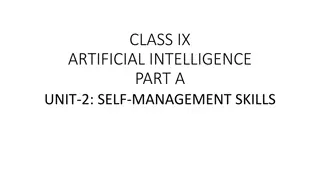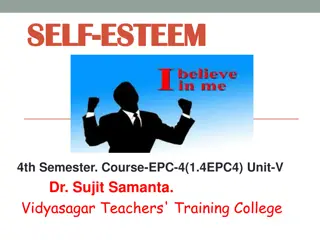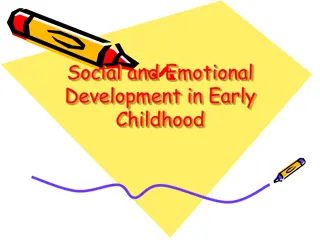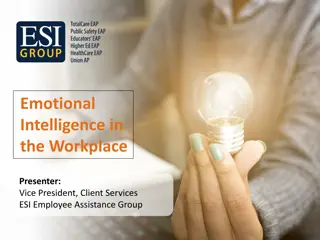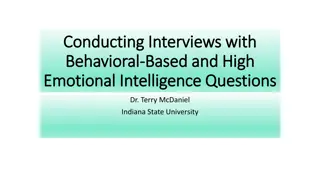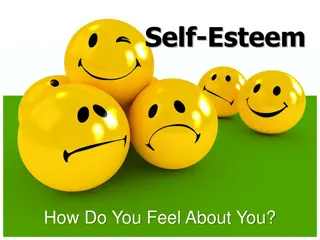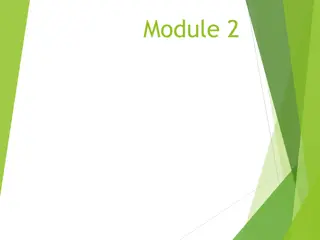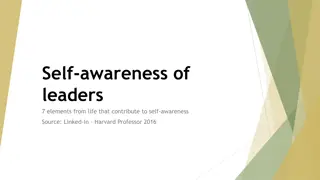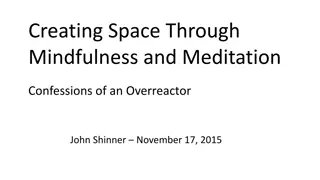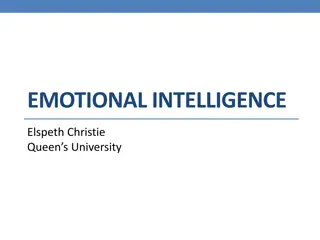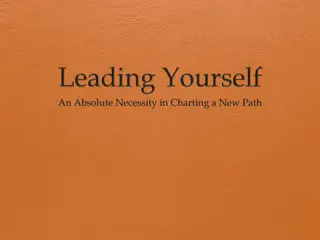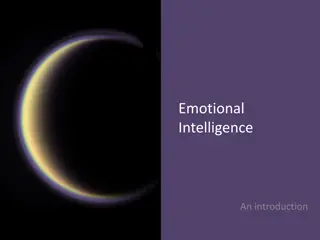Enhancing Emotional Awareness and Self-Awareness for Personal Growth
Understanding our emotions and developing self-awareness are crucial for personal growth and fostering meaningful relationships. Emotions impact various aspects of our lives, from memory and decision-making to creativity and health. Learning to recognize, regulate, and express our emotions authentically can help us navigate through life's challenges effectively. Tools like the RULER Approach and Mood Index by the Yale Center for Emotional Intelligence can aid in enhancing emotional awareness and regulation.
Download Presentation

Please find below an Image/Link to download the presentation.
The content on the website is provided AS IS for your information and personal use only. It may not be sold, licensed, or shared on other websites without obtaining consent from the author. Download presentation by click this link. If you encounter any issues during the download, it is possible that the publisher has removed the file from their server.
E N D
Presentation Transcript
Emotional Awareness Understanding our emotions
Before you put yourself in someone else s shoes, you might first take a good look at your own footwear! Kira Newman
Self-awareness: A definition The ability to focus on yourself, and understand how your actions, thoughts, or emotions are in tune with your inner values and beliefs. The ability to monitor your OWN emotions and thoughts from moment to moment is key to understanding yourself better.
Integral to self-awareness is emotional awareness! This means being aware of your emotions and how they affect you and those around you. Being aware of your OWN thoughts and feelings will help you identify emotional signals in others. It will improve your ability to empathise with other people.
Research by the Yale Center for Emotional Intelligence shows that emotions influence our: Memory and learning Attention Decision-making Health Ability to form and maintain healthy relationships Creativity
Emotions can help or hinder us Sometimes we are hijacked by intense emotions, especially unpleasant ones, such as: Our emotions can hinder us when we let anger or despair overtake us. All emotions have a part to play in who we are. Emotions can help us feel safe and content. anger despair etc.
So to prevent a single strong emotion from taking over we must learn to: Recognise Regulate Identify and label the feeling: What am I feeling? What made me feel this way? Find strategies to express emotions in a way that is: Authentic & Appropriate
The Yale Center for Emotional Intelligence has developed two tools to help you become aware of and regulate your emotions: The RULER Approach Mood Index The Mood Index used in WYS is adapted from the Center for Emotional Intelligence s Mood Meter.
Recognise: Mood Index Naming it can tame it. It provides us with a language to talk about ourfeelings. High energy High pleasure High energy Low pleasure The amount of effort the emotion involves. Can you write three examples of an emotion that fits in each colour in the mood index? Low energy Low enjoyment Low energy High enjoyment Enjoyment: How good does the emotion feel?
How many did you manage to get from this list?
Regulate The Yale Center for Emotional Intelligence developed an approach called the: Recognisingemotions in oneself and others. R Understandingthe causes and consequences of emotions. U Labellingemotions with a detailed vocabulary. L Expressingemotions in an appropriate and constructive way. E Regulatingemotions with helpful strategies. R
RULER WORKSHEET What happened? Describe an event where you experienced an intense emotion. Recognise How did I feel? Describe the sensations you had during this event. What was happening to your body? What thoughts were rushing through your head? Understand What caused this feeling? Think about what actions, words, or events led up to you and the other person having these feelings. Label Give the feeling a name? Use your mood metre and label what emotion you felt. Express How did I express this feeling? What words or actions did you use to express this emotion? Regulate What could I have done to handle the situation better? What techniques could I use in future to avoid these intense emotions taking over? For example: SBLR: Stop, Breathe, Listen, Respond Mindfulness (What can I hear? What do I feel?) Belly breathing
Exercises to regulate our emotions
Mindfulness Mindfulness is awareness that arises through paying attention, on purpose, in the present moment, non-judgementally. - Jon Kabat-Zinn Activities to practice mindfulness are: - What am I feeling? - What can I hear?
SBLR Stop Listen Breathe Respond




